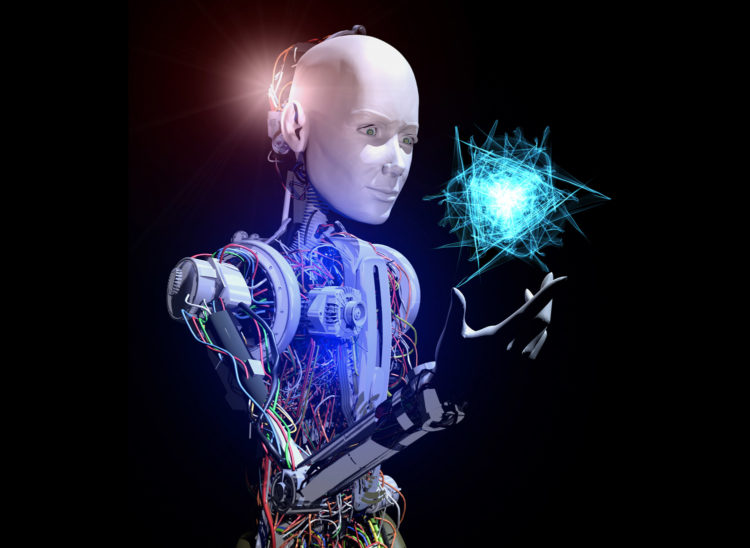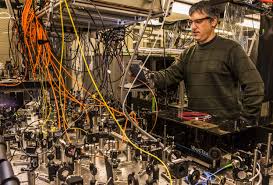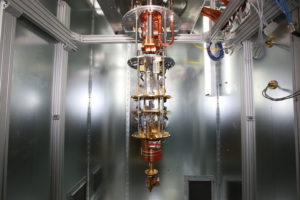The Catalyst for the Future : Quantum Computing : A Well Thought Out Scream by James Riordan

You know how a lot of science fiction stories go. Some geeky guy are messing around with something and wind up changing the whole world. As crazy as that sounds it’s happened a few times with guys like Nikola Tesla and Thomas Edison, and nerds like Steve Jobs and Bill Gates. And , according it just may happen again real soon with quantum computers. Let’s examine three unrelated problems:
- One percent of the world’s energy is used every year just to produce fertilizer.
- Solar panels aren’t powerful enough to provide all the power for most homes.
- Investing in stocks often feels like a game of Russian roulette.
 These seemingly unconnected issues canal be solved by the same tool, according to some scientists: quantum computing. Quantum computers use superconducting particles to perform tasks and have long been seen as a luxury for the top academic echelon—far removed from the common individual. But that’s quickly changing. IBM has been dabbling with commercial possibilities when last year it released Quantum Experience, a cloud-based quantum computing service researchers could use to run experiments without having to buy a quantum system. In early March, IBM took that program further and announced IBM Q, the first cloud quantum computing system for commercial use. Companies will be able to buy time on IBM’s quantum computers in New York state, though IBM has not set a release date or price, and it is expected to be financially prohibitive for smaller companies at first.
These seemingly unconnected issues canal be solved by the same tool, according to some scientists: quantum computing. Quantum computers use superconducting particles to perform tasks and have long been seen as a luxury for the top academic echelon—far removed from the common individual. But that’s quickly changing. IBM has been dabbling with commercial possibilities when last year it released Quantum Experience, a cloud-based quantum computing service researchers could use to run experiments without having to buy a quantum system. In early March, IBM took that program further and announced IBM Q, the first cloud quantum computing system for commercial use. Companies will be able to buy time on IBM’s quantum computers in New York state, though IBM has not set a release date or price, and it is expected to be financially prohibitive for smaller companies at first.
Jarrod McClean, a computing sciences fellow at Lawrence Berkeley National Laboratory, says the announcement is exciting because quantum computing wasn’t expected to hit commercial markets for decades. Last year, some experts estimated commercial experimentation could be five to 40 years away, yet here we are, and the potential applications could disrupt the way pharmaceutical companies make medicine, the way logistics companies schedule trains and the way hedge fund managers gain an edge in the stock market. “We’re seeing more application areas start to develop all the time, now that people are looking at quantum,” McClean says.
Quantum computing is as different from traditional computing as an abacus is from a MacBook. “Classical computing was [invented] in the 1940s. This is like [that creation], but even beyond it,” says Scott Crowder, IBM Systems vice president and chief technology officer of quantum computing, technical strategy and transformation. “Take everything you know about how a class of computers works and forget it.”
Besting supercomputers
Quantum computers are made up of parts called qubits, also known as quantum bits. On some problems, they leverage the strange physics of quantum mechanics to work faster than chips on a traditional computer. (Just as a plane cannot exactly compare to a race car, a classical computer will still be able to do some things better than quantum, and vice versa. They’re just different.)
Explaining how qubits work requires jumping into quantum mechanics, which doesn’t follow the same rules of physics we’re used to in our everyday lives. Quantum entanglement and quantum superposition are particularly important; they defy common sense but take place only in environments that are incredibly tiny.
 Quantum superposition is important because it allows the qubit to do two things at once. Technically, it allows the qubit to be two things at once. While traditional computers put bits in 0 and 1 configurations to calculate steps, a qubit can be a 0 and a 1 at the same time. Quantum entanglement, another purely quantum property, takes the possibilities a step further by intertwining the characteristics of two different qubits, allowing for even more calculations. Calculations that would take longer than a human’s life span to work out on a classic computer can be completed in a matter of days or hours.
Quantum superposition is important because it allows the qubit to do two things at once. Technically, it allows the qubit to be two things at once. While traditional computers put bits in 0 and 1 configurations to calculate steps, a qubit can be a 0 and a 1 at the same time. Quantum entanglement, another purely quantum property, takes the possibilities a step further by intertwining the characteristics of two different qubits, allowing for even more calculations. Calculations that would take longer than a human’s life span to work out on a classic computer can be completed in a matter of days or hours.
Eventually, quantum computing could outperform the world’s fastest supercomputer—and then all computers ever made, combined. We aren’t there yet, but at 50 qubits, universal quantum computing would reach that inflection point and be able to solve problems existing computers can’t handle, says Jerry Chow, a member of IBM’s experimental quantum computing department. He added that IBM plans to build and distribute a 50-qubit system “in the next few years.” Google aims to complete a 49-qubit system by the end of 2017.
Some experts aren’t convinced IBM’s move into the commercial market is significant. Yoshihisa Yamamoto, a Stanford University physics professor, says, “I expect the IBM quantum computer has a long way to go before it is commercialized to change our everyday life.”
Caltech assistant professor of computing and mathematical sciences Thomas Vidick says IBM’s commercialization of quantum computing feels “a bit premature” and estimates it will still be 10 to 20 years before commercial applications are mainstream. “The point is that quantum hardware hasn’t reached maturity yet,” he explains. “These are large machines, but they are hard to control. There is a big overhead in the transformation that maps the problem you want to solve to a problem that the machine can solve, one that fits its architecture.”
Despite the skepticism, many researchers are pumped. “While the current systems aren’t likely to solve a computational problem that regular computers can’t already solve, preparing the software layer in advance will help us hit the ground running when systems large enough to be useful become available,” says Michele Mosca, co-founder of the Institute for Quantum Computing at Ontario’s University of Waterloo. “Everyday life will start to get affected once larger-scale quantum computers are built and they are used to solve important design and optimization problems.”
 A company called D-Wave Systems already sells 2,000-qubit systems, but its systems are different from IBM’s and other forms of universal quantum computers, so many experts don’t consider their development to have reached that quantum finish line. D-Wave Systems’s computers are a type of quantum computer called quantum annealers, and they are limited because they can be used only on optimization problems. There is a roaring scientific debate about whether quantum annealers could eventually outpace traditional supercomputers, but regardless, this type of quantum computer is really good at one niche problem and can’t expand beyond that right now.
A company called D-Wave Systems already sells 2,000-qubit systems, but its systems are different from IBM’s and other forms of universal quantum computers, so many experts don’t consider their development to have reached that quantum finish line. D-Wave Systems’s computers are a type of quantum computer called quantum annealers, and they are limited because they can be used only on optimization problems. There is a roaring scientific debate about whether quantum annealers could eventually outpace traditional supercomputers, but regardless, this type of quantum computer is really good at one niche problem and can’t expand beyond that right now.
Practical Applications
What problems could be so complicated they would require a quantum computer? Take fertilizer production, McClean says. The power-hungry process to make mass-produced fertilizer accounts for 1 percent to 2 percent of the world’s energy use per year. But there’s a type of cyanobacteria that uses an enzyme to do nitrogen fixation at room temperature, which means it uses energy far more efficiently than industrial methods. “It’s been too challenging for classical systems to date,” McClean says, but he notes that quantum computers would probably be able to reveal the enzyme’s secrets so researchers could re-create the process synthetically. “It’s such an interesting problem from a point of view of how nature is able to do this particular type of catalysis,” he adds.
Pharmaceutical science could also benefit. One of the limitations to developing better, cheaper drugs is problems that arise when dealing with electronic structures, McClean says. Except with the simplest structures, like hydrogen-based molecules, understanding atomic and subatomic motion requires running computer simulations. But even that breaks down with more complex molecules. “You don’t even ask those questions on a classical computer because you know you’re going to get it wrong,” Crowder says.
 The ability to predict how molecules react with other drugs, and the efficacy of certain catalysts in drug development, could drastically speed up the pace of pharmaceutical development and, ideally, lower prices, McClean says.
The ability to predict how molecules react with other drugs, and the efficacy of certain catalysts in drug development, could drastically speed up the pace of pharmaceutical development and, ideally, lower prices, McClean says.
Finance is also plagued by complicated problems with multiple moving parts, says Marcos López de Prado, a research fellow in the Computational Research Department at Lawrence Berkeley National Laboratory. Creating a dynamic investment portfolio that can adjust to the markets with artificial intelligence, or running simulations with multiple variables, would be ideal, but current computers aren’t advanced enough to make this method possible. “The problem is that a portfolio that is optimal today may not be optimal tomorrow,” López de Prado says, “and the rebalance between the two can be so costly as to defeat its purpose.”
Quantum computing could figure out the optimal way to rebalance portfolios day by day (or minute by minute) since that “will require a computing power beyond the current potential of digital computers,” says López de Prado, who is also a senior managing director at Guggenheim Partners. “Instead of listening to gurus or watching TV shows with Wall Street connections, we could finally get the tools needed to replace guesswork with science.”
 While business applications within quantum computing are mostly hopeful theories, there’s one area where experts agree quantum could be valuable: optimization. Using quantum computing to create a program that “thinks” through how to make business operations faster, smarter and cheaper could revolutionize countless industries, López de Prado says.
While business applications within quantum computing are mostly hopeful theories, there’s one area where experts agree quantum could be valuable: optimization. Using quantum computing to create a program that “thinks” through how to make business operations faster, smarter and cheaper could revolutionize countless industries, López de Prado says.
For example, quantum computers could be used to organize delivery truck routes so holiday gifts arrive faster during the rush before Christmas. They could take thousands of self-driving cars and organize them on the highway so all the drivers get to their destination via the fastest route. They could create automated translating software so international businesses don’t have to bother with delays caused from translating emails. “Optimization is just a generic hammer they can use on all these nails,” McClean says.
One day, quantum might even be used for nationwide problems, like optimizing the entire U.S. economy or organizing a national power grid.
Just as computers presented a huge advantage to the handful of companies that could afford them when they first came on the commercial market, it’s possible that a few companies might gain a tactical advantage by using quantum computing now. For example, if only a few investors use quantum computing to balance portfolios, the rest of the market will probably lose money. “But what happens when quantum computing goes mainstream?” asks López de Prado. “That tactical disadvantage disappears. Instead, everyone will be able to make better investment decisions. People will rely on science rather than stories.”
___





No Comment